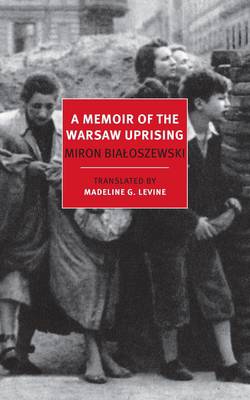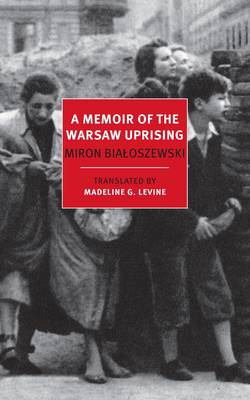
Door een staking bij bpost kan je online bestelling op dit moment iets langer onderweg zijn dan voorzien. Dringend iets nodig? Onze winkels ontvangen jou met open armen!
- Afhalen na 1 uur in een winkel met voorraad
- Gratis thuislevering in België vanaf € 30
- Ruim aanbod met 7 miljoen producten
Door een staking bij bpost kan je online bestelling op dit moment iets langer onderweg zijn dan voorzien. Dringend iets nodig? Onze winkels ontvangen jou met open armen!
- Afhalen na 1 uur in een winkel met voorraad
- Gratis thuislevering in België vanaf € 30
- Ruim aanbod met 7 miljoen producten
Zoeken
Omschrijving
On August 1, 1944, Miron Bialoszewski, later to gain renown as one of Poland's most innovative poets, went out to run an errand for his mother and ran into history. With Soviet forces on the outskirts of Warsaw, the Polish capital revolted against five years of Nazi occupation, an uprising that began in a spirit of heroic optimism. Sixty-three days later it came to a tragic end. The Nazis suppressed the insurgents ruthlessly, reducing Warsaw to rubble while slaughtering some 200,000 people, mostly through mass executions. The Red Army simply looked on. Bialoszewski's blow-by-blow account of the uprising brings it alive in all its desperate urgency. Here we are in the shoes of a young man slipping back and forth under German fire, dodging sniper bullets, collapsing with exhaustion, rescuing the wounded, burying the dead. An indispensable and unforgettable act of witness, A Memoir of the Warsaw Uprising is also a major work of literature. Bialoszewski writes in short, stabbing, splintered, breathless sentences attuned to "the glaring identity of 'now.'" His pages are full of a white-knuckled poetry that resists the very destruction it records. Madeline G. Levine has extensively revised her 1977 translation, and passages that were unpublishable in Communist Poland have been restored.
Specificaties
Betrokkenen
- Auteur(s):
- Uitgeverij:
Inhoud
- Aantal bladzijden:
- 288
- Taal:
- Engels
- Reeks:
Eigenschappen
- Productcode (EAN):
- 9781590176658
- Verschijningsdatum:
- 27/10/2015
- Uitvoering:
- Paperback
- Formaat:
- Trade paperback (VS)
- Afmetingen:
- 127 mm x 203 mm
- Gewicht:
- 272 g

Alleen bij Standaard Boekhandel
+ 49 punten op je klantenkaart van Standaard Boekhandel
Beoordelingen
We publiceren alleen reviews die voldoen aan de voorwaarden voor reviews. Bekijk onze voorwaarden voor reviews.











